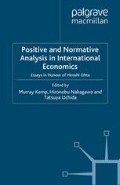Abstract
Innovation plays a key role in the theory of economic growth, but it contains different elements. These can be divided into two broad categories – process innovations and product innovations. The former may also be named ‘cost-reducing innovations’ in the sense that they take place through the discovery of new processes to produce the old products at lower costs. By contrast, the latter may be called ‘quality-improving innovations’ since they occur through the creation of new, higher- quality products. Both categories of innovations are, of course, important as engines of economic development, but their implications for economic welfare can vary enormously from time to time and from place to place. In poor economies in the early stage of development, process innovations in the daily necessities contribute significantly to the life of people. In affluent societies in the modern age, however, ‘it would be a terribly dull life if innovations only reduced costs of producing the same menu of goods and services that now populate their markets’.1 Product innovations are crucially important in such a situation. This chapter compares the welfare implications of cost-reducing and quality-improving innovations in the context of modern international economies in which both poor and affluent countries coexist and interact.
This chapter was originally published in Keio Economic Studies 46, 2010, 1–15. Reprint permission granted by the Keio Economic Society is gratefully acknowledged. An earlier draft of this chapter was presented at the International Workshop on Positive and Normative Analysis in International Economics, organized by Aoyama Gakuin University on 12 March 2010. I benefited from helpful comments from the participants of the Workshop, especially Professors Martin McGuire, Murray Kemp and Hirohi Ohta among others.
Access this chapter
Tax calculation will be finalised at checkout
Purchases are for personal use only
Preview
Unable to display preview. Download preview PDF.
References
Bhagwati, J. (1958a) ‘Immiserizing Growth: A Geometrical Note’, Review of Economic Studies, 25, 201–5.
Bhagwati, J. (1958b) ‘International Trade and Economic Expansion’, American Economic Review, 48, 941–53.
Krishna, K. (1987) ‘Tariffs versus Quota with Endogenous Quality’, Journal of International Economics, 23, 97–122.
Krugman, P. (1994) ‘Competitiveness; A Dangerous Obsession’, Foreign Affairs, March/April, 28–44.
Krugman, P. (1996), Pop Internationalism ( Cambridge, MA: The MIT Press).
Lipsey, R. E. (1994) ‘Quality Change and Other Influences on Measures of Export Prices of Manufactured Goods and the Terms of Trade between Primary Products and Manufactures’, NBER Working Paper 4671.
Oi, W. Y. (1997) ‘The Welfare Implications of Invention’, in Timothy F. Bresnahan and Robert J. Gordon (eds), The Economics of New Goods, NBER (Chicago: University of Chicago Press ).
Prebisch, R. (1949) The Economic Development of Latin America and its Principal Problems ( New York: United Nations).
Singer, H. W. (1950) ‘The Distribution of Gains between Investing and Borrowing Countries’, American Economic Review, 40, 473–85.
Spence, A. M. (1976) ‘Monopoly, Quality and Regulation’, Bell Journal of Economics, 6, 417–29.
Editor information
Editors and Affiliations
Copyright information
© 2012 Michihiro Ohyama
About this chapter
Cite this chapter
Ohyama, M. (2012). Innovations and International Trade. In: Kemp, M.C., Nakagawa, H., Uchida, T. (eds) Positive and Normative Analysis in International Economics. Palgrave Macmillan, London. https://doi.org/10.1057/9780230348202_4
Download citation
DOI: https://doi.org/10.1057/9780230348202_4
Publisher Name: Palgrave Macmillan, London
Print ISBN: 978-1-349-33914-3
Online ISBN: 978-0-230-34820-2
eBook Packages: Palgrave Economics & Finance CollectionEconomics and Finance (R0)

